|
|
|
Sort Order |
|
|
|
Items / Page
|
|
|
|
|
|
|
| Srl | Item |
| 1 |
ID:
128223
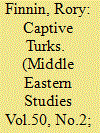

|
|
|
|
|
| Publication |
2014.
|
| Summary/Abstract |
It has become accepted that, during the Soviet period, Turkey 'ignored the plight' of the Crimean Tatars, who were brutally deported to Central Asia by Stalin in 1944. This narrative of Turkish indifference with respect to the Crimean Tatar 'question' overlooks a corpus of material that tells something of a different story. This corpus is literary. The Crimean Tatars figured centrally in Pan-Turkist poems and pulp fiction novels as protagonists whose victimization by the Communist regime was represented in order to provoke outrage and action, not silence and passivity. These literary texts seek to elicit in the reader what can be called ' irredentist solidarity , a convergence of fellow-feeling that involves a total identification of the Other as the same.
|
|
|
|
|
|
|
|
|
|
|
|
|
|
|
|
| 2 |
ID:
124481
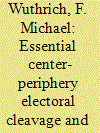

|
|
|
|
|
| Publication |
2013.
|
| Summary/Abstract |
For nearly forty years, scholars have utilized the metanarrative of a center-periphery cleavage first proposed by ?erif Mardin to explain a variety of phenomena in Turkish politics and society. When used to interpret electoral cleavages in the multiparty period, however, a center-periphery cleavage cannot effectively explain electoral outcomes. Focusing on the initial stage of multiparty competition, when the cleavage is often said to have been most salient, this article explores the empirical evidence to show that the concept as commonly employed has actually confounded an effective understanding of electoral behavior in Turkey. Rather than demonstrating a clear electoral division between the elites of the social center and the masses during this period, the article reveals two distinct cross-cutting patron-client strategies used by elite-dominated parties to cater to the rural population. The significant patterns of change in Turkey's electoral outcomes over time further illustrate the need to focus on how political parties and elites accumulate votes-that is, on their vote targeting strategies-rather than rely on static sociopolitical cleavages.
|
|
|
|
|
|
|
|
|
|
|
|
|
|
|
|
| 3 |
ID:
131451
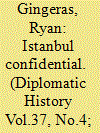

|
|
|
|
|
| Publication |
2013.
|
| Summary/Abstract |
This article provides an intimate survey of the construction and early evolution of one element of America's security relationship with Turkey: the development of joint counter-narcotics operations in the city of Istanbul. In exploring how American officials came to influence the policing of narcotics trafficking in Turkey's largest city between the years 1948 and 1960, this piece hopes to contribute to two specific historiographical issues. First, the research presented here adds to the growing body of literature on the history of U.S. antinarcotics policies on the world stage. Secondly, it attempts to shed new light on the relationship between Turkey's narcotics economy and the evolution of the modern Turkish state. A close reading of how both Turkish and American officials approached narcotics trafficking at this stage in the Cold War affirms the degree to which law enforcement officials (particularly in counter-narcotics efforts) constrained their efforts for the sake of larger national security prerogatives. The case present here in this article provides instructive examples of how the so-called "war on drugs," even at this embryonic stage, ultimately served to promote American hegemony in Turkey and beyond.
|
|
|
|
|
|
|
|
|
|
|
|
|
|
|
|
| 4 |
ID:
133533
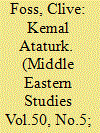

|
|
|
|
|
| Publication |
2014.
|
| Summary/Abstract |
Kemal Atatürk wanted to break with the past by providing his new nation with a new history that would give the Turks pride by showing that they were an ancient and civilized nation. The textbook produced under his personal supervision presented the Turks as central to the development of virtually all ancient civilizations. This became an official doctrine promulgated in historical congresses and many publications. It drew heavily on European writers, among them Gobineau and H.G. Wells. Although presented as a novel achievement, the new history had its roots in the recent Turkish past whose ideas were given a coherent form by Atatürk.
|
|
|
|
|
|
|
|
|
|
|
|
|
|
|
|
| 5 |
ID:
133823
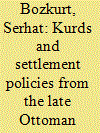

|
|
|
|
|
| Publication |
2014.
|
| Summary/Abstract |
This article highlights the continuities and discontinuities between the settlement policies of the late Ottoman state and early Republican Turkey. It argues that although there was a certain degree of evolution in the language employed by the state between the late Ottoman and Republican periods, there is a significant amount of overlap between the policies pursued by the Committee of Union and Progress which seized power in 1913 and the Kemalist regime established in the early 1920s towards the Kurds. In short, the emergence of settlement policies aimed at assimilating the Kurds into the Turkish nation are not an innovation of the Kemalists; it is possible to trace them to the late Ottoman period. This is substantiated through a comparison of two laws relating to settlement; the 1916 "Ordinance Outlining the Transfer and Settlement as well as the Sustenance and Maintenance for Refugees arriving from Conflict Zones" prepared by the Ottoman Ministry of the Interior's General Directorate for Tribes and Refugees and the Settlement Law of 1934, which was implemented in Republican Turkey and which remained on the statute books until 2006.
|
|
|
|
|
|
|
|
|
|
|
|
|
|
|
|
| 6 |
ID:
133526
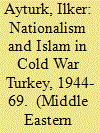

|
|
|
|
|
| Publication |
2014.
|
| Summary/Abstract |
Our current knowledge on the history of Turkish nationalism during the Cold War is a blend of facts and myths. One of those myths is the argument that the Turks developed a special relationship with Islam following their massive conversion in the eleventh century to the extent that religion has become the most important ingredient in Turkish national identity over time, even more pronounced than ethnic attributes. Secular visions of Turkish nationalism, on the other hand, which emphasize ethnic characteristics, are generally regarded as curious but unimportant exceptions. This article challenges that narrative and maintains that the alleged unimportance of secular nationalism is an invention of the late 1960s. It provides evidence that there was no consensus among Turkish nationalists on the question of Islam; on the contrary, the role of Islam in the making of Turkish identity was the most hotly debated topic among rival nationalist circles. It was not until the turning point in 1969 that a host of factors such as demographic change, anti-Kemalist and anti-RPP sentiments, and electoral behaviour in Cold War Turkey convinced Turkish nationalists to adopt a more Islamic-leaning discourse to be more successful at the ballot box.
|
|
|
|
|
|
|
|
|
|
|
|
|
|
|
|
| 7 |
ID:
128224
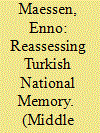

|
|
|
|
|
| Publication |
2014.
|
| Summary/Abstract |
In this article continuity and discontinuity of interpretations and manipulations of national memory during the successive governments of the Adalet ve Kalk?nma Partisi (Justice and Development Party - AKP) in Turkey are investigated. The strong continuities between the Islamist parties of the 1990s and the AKP, with regard to the way they consider and manipulate Ottoman history as a means of political legitimation, are demonstrated. In addition, the continuity between the AKP's style of governance and that of preceding governments is shown. The conclusion of the article is that, in addition to continuities with its Islamist predecessors, the AKP is to a large extent still embedded within the boundaries of the nationalist framework set out by Kemalism with regard to the party's stance on Turkish citizenship, national identity, traumas in national history and leader-centred politics.
|
|
|
|
|
|
|
|
|
|
|
|
|
|
|
|
| 8 |
ID:
001625


|
|
|
|
|
| Edition |
1st ed.
|
| Publication |
London, Frank Cass, 1997.
|
| Description |
x, 126p.hbk
|
| Standard Number |
0714630756
|
|
|
|
|
|
|
|
|
|
|
|
Copies: C:1/I:0,R:0,Q:0
Circulation
| Accession# | Call# | Current Location | Status | Policy | Location |
| 041215 | 956.1015/KUS 041215 | Main | On Shelf | General | |
|
|
|
|
| 9 |
ID:
005426
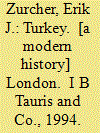

|
|
|
|
|
| Publication |
London, I B Tauris and Co., 1994.
|
| Description |
xii.381p.
|
| Standard Number |
1850438269
|
|
|
|
|
|
|
|
|
|
|
|
Copies: C:1/I:0,R:0,Q:0
Circulation
| Accession# | Call# | Current Location | Status | Policy | Location |
| 036716 | 956.1/ZUR 036716 | Main | Withdrawn | General | |
|
|
|
|
| 10 |
ID:
000609
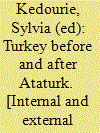

|
|
|
|
|
| Publication |
London, Frank Cass, 1999.
|
| Description |
xx, 282p.
|
| Standard Number |
0714649473
|
|
|
|
|
|
|
|
|
|
|
|
Copies: C:1/I:0,R:0,Q:0
Circulation
| Accession# | Call# | Current Location | Status | Policy | Location |
| 041999 | 320.9561/KED 041999 | Main | On Shelf | General | |
|
|
|
|
| 11 |
ID:
131563
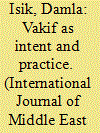

|
|
|
|
|
| Publication |
2014.
|
| Summary/Abstract |
Through ethnographic and archival research conducted in Istanbul and Izmir, this article examines the dynamics and regulation of charitable giving in contemporary Turkey. The article is based on interviews I conducted with the volunteers, employees, and aid recipients of three civil society organizations that rely on charitable giving to fund their projects, which center on helping the poor and providing aid during and after wars and other disasters. I document how religious ideals of anonymous charitable giving for the sake of giving, without expectation of return, are closely intertwined with anxiety over finding a worthy charitable association and recipient. In doing so, I focus on vak?f as both a concept and a practice that gives meaning to charitable giving in Turkey. The increasing desire to document, define, and categorize the deserving poor as a way to justify the intent to give and to receive goes against the anonymity and immediacy of giving, thus riddling intent with ethical contradictions. I argue that attention needs to be paid to the intent, practice, and various forms of giving, and not just to the effects and outcomes of charity.
|
|
|
|
|
|
|
|
|
|
|
|
|
|
|
|
|
|
|
|
|